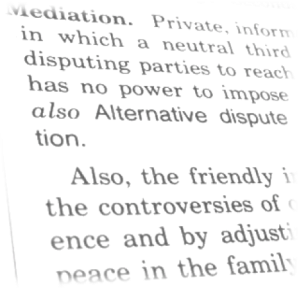Over my almost seventeen years of practice as a family law attorney and family law mediator I am often asked very similar questions over and over again. One of those questions is, “How should I tell my children that we are getting a divorce?”
I have always felt that question is incredibly difficult to answer. Most parents are genuinely motivated to minimize the emotional harm that a divorce or separation would cause to their children. I have struggled over the years to suggest a response that I truly felt certain would be beneficial and helpful to all involved. This is why I am sharing the article below: I believe it is an impressive explanation that offers some excellent suggestions for how to break the news of your impending divorce with your children. I love the real-life examples and hope that it may assist you through your difficult emotional journey.
For the original article posting click here
What Should We Tell the Children? Developing a Mutual Story of the Divorce
by Donald T. Saposnek
One of the most typical questions asked of me by parents who are beginning the divorce process is, “What should we tell the children and how should we tell them?” Most parents, understandably, feel awful in having to tell their children about their pending divorce and how all their lives are going to be permanently changed. Such a task can generate tremendous pangs of guilt, sadness, and anger. Moreover, parents want to protect their children from the emotional pain of divorce, and want to protect their children from viewing themselves as the cause of the divorce.
In the midst of these difficult and confusing feelings, many parents do not even tell their children about the separation and divorce until days or even weeks after one of the parents has moved out of the house. However, not telling the children the truth in advance actually leaves them feeling betrayed and deceived by their parents. It also leaves them ill prepared for this major event of their lives. Child development experts agree that deceiving or withholding the truth about their parents’ separation and divorce does not protect children. Children always do better in hearing the truth than in hearing a lie or misleading information from a parent. It is not the parents’ job to protect their children from truth. Rather, parents should give accurate and truthful information, and then help their children deal with the feelings that are generated. What to Tell the Children: The Mutual Story of the Divorce
In my many years of working with divorcing families, I’ve learned that one of the most important first steps that parents can take in preparing their children for the changes ahead is to develop, together, a “mutual story of the divorce,” and to tell it to their children together as a family at the same time. If instead, each parent, without conferring with the other, tells the children, separately and at separate times, why they are getting a divorce, then the children frequently will hear two different stories. And, because of the complexity of marital relationships, these two stories are often opposite, individualized versions of the couple’s truth. What the children typically report is some version of the following: “Mom first told me why they’re getting divorced, and then Dad, later, told me the opposite. That leaves me confused. One of them must be lying to me, but I’m not sure which one. Now, I don’t think I can trust either parent.”
Understandably, when parents divorce, each has his or her version of the reasons for the split-up. Moreover, each parent typically attributes the cause of the divorce to the other parent. Because marital separations tend to be very complex, multi-layered matters, with multiple contributing factors, both parents may be presenting accurate realities from their respective points of view. However, children believe that there can only be one truth about a given matter. The idea that there may be multiple truths is beyond the grasp of most children, since it requires a level of abstract thinking of which children are not yet capable (except, perhaps, for older teenagers). Thus, in order to help children come to terms with the fact of their parents’ divorce, it is most helpful for them to hear only one mutual and consistent story of why their parents split up.
The idea of telling your children the story of your divorce is rooted in the time-honored ritual of story telling–a tradition that goes back thousands of years. Children love stories. They typically loved to hear the story of your courtship and your marriage, as well as the story of their own birth and development. Most children ask to hear these stories over and over, throughout their childhood. Story telling is a very powerful ritual for bonding relationships and communities alike.
While the suggestion to utilize a bonding tradition during a divorce may seem odd, it is actually quite credible. From a child’s point of view, the best divorce is viewed not as the break-up of a family, but as the re-organization of the family unit across two households. Moreover, children are helped to process the divorce when their parents encourage them to bond with both parents within the reorganized family unit.
Children do not like hearing that one of their parents is the cause for the divorce and is responsible for the pain of everyone in the family. Children don’t like having a “bad” parent, but prefer to have two good parents. When the divorce is blamed on one of the parents, the children, in effect, are being persuaded to relinquish love for that parent, or, to feel confused and guilty about loving their “bad” parent and displeasing their “good” parent. If, however, both parents mutually take responsibility for the break-up, then their children are set free from being caught in the middle of a loyalty conflict.
When I ask parents to formulate a mutual story of their divorce, initially, many are unable. Most of us, when rejected by a person we love or once loved, tend to protect our self-esteem by blaming another for our failures. Certainly, divorce provides a golden opportunity to do this. However, when each parent resists and rises above this tendency for the sake of the children, the children are provided a chance for a better outcome.
Arriving at a mutual story becomes easier after considering the ways in which a given event can be framed. Several examples follow:
Divorce Scenario #1:
Consider, for example, a typical scenario of divorce. Mother and Father had been emotionally drifting apart from one another for several years. Father met an attractive woman at work and had an affair. Mother found out about it, reacted with rage, kicked him out, and then filed for divorce.
Mother, alone, might tell the children that Mom and Dad are getting divorced because their father was unfaithful and cheated on her. She might add that he spent all of his time at work, rather than with his family, and that she is tired of shouldering all the responsibilities of the family by herself.
Father might explain to the children that Mother has not shown any affection to him in two years, that she obviously doesn’t love him, and he is tired of trying to get her to love him. So, he finally has decided to leave the marriage. He adds that he feels angry at her for forcing the break-up the family and making the children lose their father.
These certainly are two accurate ways to describe this divorce, as they each represent the respective emotional truths of each spouse. However, if the children were told these two different stories, they would certainly be confused and angry.
A “mutual story” of this divorce might be something like the following: “We have been married for 13 years, and we both love you children very much. We used to also love each other a lot, and we still do care about each other. But, over the years, we both realized that we didn’t love each other like married couples should. We have been unhappy with each other for a long time. We’ve tried to make it better. We even went to counseling, but it didn’t help. We’ve tried really hard to love each other again, but it just hasn’t worked. We each feel that we will be happier living apart from one another, and that we will be better parents to you if we live apart and are happier. We will both still be with you regularly and continue to take care of you, but at different houses.”
Divorce Scenario #2:
In another divorce scenario, Mother feels that Father has been very controlling and very angry at her, intensely dislikes her friends, shows no affection towards her, and rarely spends time with the family. There has been a high level of overt conflict between them for many years, and the children have witnessed much fighting. Mother feels isolated and lonely, has developed her own separate social life, and she finally files for divorce.
Typically, Mother might separately tell the children: “Your father has been trying to control my life for too long, and he has hurt me terribly. He won’t let me do anything I want and he always tries to tell me what to do. You all know how he starts fights with me all the time. You kids and I are leaving him so we don’t have to take this any more from him.”
Father might separately tell the children: “Your mother doesn’t really want to be a mother anymore. She just wants to run around with her friends, go out drinking, and not take care of you. She wants to divorce me because she just doesn’t want to be a responsible adult any longer. I’ve tried to get her to listen to me and to be reasonable. I wish she didn’t want to abandon you kids. Then we could be a real family!”
A mutual story of this divorce might sound like this: “We have not been happy with each other for some time. It seems that we have grown apart and have very different interests now. We don’t make each other happy living together and, as you know, we just fight when we are around each other, and we know that you kids really hate that. We have decided that we will both be better off living apart. The fighting will stop, and we each will be happier living separately. However, we both still love you and you have permission from each of us to continue loving both of us, even if we don’t love each other enough to live together anymore.”
In summary, parents should try to give their children a basic statement as to the reasons for the separation, while sparing them the adult details about the marital relationship. Even in the most difficult and painful cases of marital separation, if the parents really want to spare their children the pain of being caught in loyalty conflict, they will figure out a way to develop a mutual story of the divorce. This story should be one in which neither parent is a “bad guy,” and each parent can continue to develop a separate and loving relationship with the children. . The specific words used in the above examples of mutual stories are just models of what are possible to say. Use your own words to express these ideas, keeping the concept of mutuality of the decision as your main focus.
After offering the mutual story of divorce, then explain to them, in as much detail as possible, how their daily routines will proceed and the schedule for how they will be sharing time between their parents. If you aren’t sure of the final schedule for time-sharing of the children after the separation, reassure the children that you two will work out these details and will let them know just as soon as they are set in place.
HOW to Tell the Children:
* Tell your children the truth about the separation and divorce in advance, whenever possible.
* Both parents together should tell the children. If there is more than one child, it is generally better to tell the siblings together. This optimizes the support they will feel from each other and from the family meeting together to discuss this important news. The discussion should take place at a time that is distraction-free and at a place, such as home, that is familiar and comfortable.
* Use words that are addressed to the specific developmental level of your child or to each of your children’s level of understanding. Talk to young children more slowly and with simple words and simple phrases. Talk to older children and adolescents in more adult ways.
* Set aside enough time to answer any questions that the children may have about what is going to happen after the separation. Do not tell them right before you have a business meeting, a phone conference call, a hair appointment, or a soccer practice. Allow several hours of unplanned time after this discussion.
If parents work together in their divorce, even if they weren’t able to work together in their marriage, the children will benefit. Remember that even if the first wish of children of divorce (i.e. that Mom and Dad will get back together) can’t come true, their second wish (i.e. that Mom and Dad will cooperate with each other and not fight) can come true. That is up to you. Please make it happen, for the sake of your children. Begin with developing a mutual story of your divorce.
Biography inShare
Donald T. Saposnek, Ph.D., is a clinical-child psychologist and family therapist in practice since 1971, a child custody mediator, trainer and consultant since 1977, and is a founding board member of the Academy of Professional Family Mediators and Editor of The Professional Family Mediator. He has published extensively in the professional literature on child custody and child psychology and is on the editorial boards of the Family Court Review and the Conflict Resolution Quarterly journals. He is the author of Mediating Child Custody Disputes: A Strategic Approach, and co-author of Splitting America: How Politicians, Super Pacs and the News Media Mirror High Conflict Divorce. He has been teaching on the psychology faculty at the University of California, Santa Cruz since 1977, and is Adjunct Professor at Pepperdine University School of Law, Straus Institute for Dispute Resolution. His website is: http://www.mediate.com/dsaposnek.


